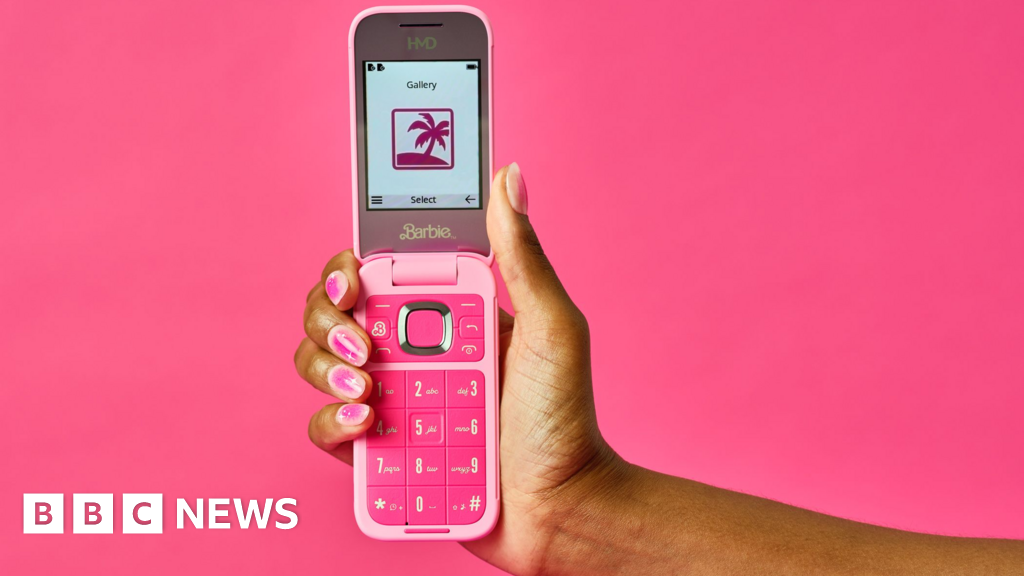
A Barbie-branded phone has been launched in the UK and Europe with the aim, its makers say, of helping young people take a break from their smartphones.
It’s a very pink and very basic device, with no front camera, only one game and very limited internet access.
Smartphone maker HMD, which also makes phones for Nokia, says it is trying to capitalise on what it calls a “surge” in people wanting a smaller “digital footprint” in their lives.
But others say it’s better achieved by teaching people how to use their devices in a healthier, more controlled way.
There are growing calls from parents and activists to limit the time children spend on smartphones, or even ban the devices altogether.
Their concerns range from suspicion that children may end up with reduced attention spans, to fear that they will be exposed to harmful or illegal content.
Some schools are taking action, and perhaps the most noticeable is this: The best known tuition fee school in the UK, Eton CollegeIt provides some of its students with “brick” phones — sometimes also called feature phones — that can only send and receive text messages and calls.
She says she wants to “balance the benefits and challenges that technology brings to schools.”
This week Mobile network EE has entered the discussion. By advising parents not to allow their children under the age of 11 to own smartphones at all.
Lars Silberbauer, a senior executive at HMD, says his company is responding to these trends.
“We’ve seen this upswing that started in the US and has moved to Europe, where more and more people really want to not have a digital experience all the time,” he said.
Some may question the nobility of Mr Silberbauer’s motives – he has admitted that he would “love” to be able to integrate a messaging platform like WhatsApp into Barbie’s phone.
But I spent a day using it, and so far, there’s no doubt that it was definitely effective as a digital detox given its very limited functionality.
It’s a flip phone with no app store or touch screen. I had no social media at all, and the phone can’t receive anything more advanced than SMS.
This means no text messages with “read receipts” or the ability to see if someone is typing. This is the default setting on many smartphones – so I didn’t receive many texts either.
Even with predictive text enabled, I found the number and letter pad to be much slower than the touchscreen keyboard, and as a result I ended up calling more people than usual, which probably wasn’t a bad thing.
And I discovered that you can only play the old Nokia Snake game a limited number of times, even when it’s called Malibu Snake and it’s pink.
But the phone certainly attracted a lot of attention, especially from girls and young women, as I walked around Glasgow city centre with it.
There is, of course, a risk that instead of being pestered for a smartphone, parents will find themselves being pestered for a piece of Barbie merchandise – which could also be undesirable.
The phone is priced at £99 at launch in the UK – double what you’d pay for a non-Nokia feature phone. There are plenty of other phones on the market that offer the same limited functionality, but without any sort of tie-up with a major company.
“I imagine many people will be tempted to buy this phone as a bit of a pastime, but in reality, everyone is so dependent on their smartphones that anything more than the odd detox day would be overkill,” says Ben Wood, a phone expert who has his own museum of gadgets released over the years.
However, he says there is a market for what are sometimes called “smartphones”. His company, CCS Insight, estimates that around 400,000 such devices will be sold in the UK this year.
“This is an attractive niche for a company like HMD,” he says.
Some experts suggest that taking away smartphones is not a real solution — they are part of our lives, after all — and instead, children should be taught how to use them in a healthy and safe way.
“What we should be doing instead is thinking about how to build really good, long-term sustainable digital literacy skills in this generation,” says Pete Etchells, professor of psychology and science communication at Bath Spa University, who has written extensively on the issue of screen time.
“I think we could all do better at using our phones in a healthier, more flexible way,” he said.
HMD is also working on a separate project, a new device it’s designing in collaboration with parents. The company says more than 1,000 people have signed up to work on the device so far.
Mr. Silberbaum admits that the resulting phone could end up being something that falls somewhere between a dumb phone and a smartphone.
“Do I want a smartphone with all the bells and whistles, or do I want something that can actually help me take a more thoughtful approach to the digital world? That’s the choice we want to offer,” he said.

“Certified food guru. Internet maven. Bacon junkie. Tv enthusiast. Avid writer. Gamer. Beeraholic.”





More Stories
Google hints at ‘amazing things’ coming in Android 17 as AI takes center stage
Nintendo is launching a music app with themes from Mario and Zelda, and more importantly, a Wii Shop channel
The Google Pixel Tablet 3 will take another step towards replacing your laptop